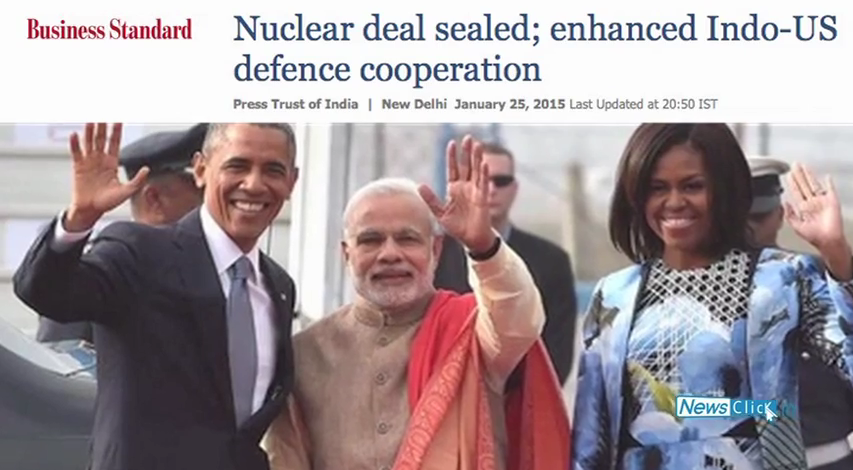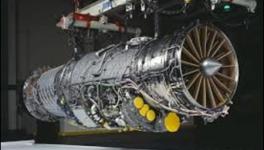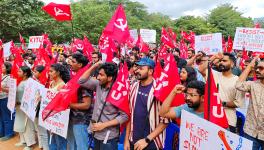Defence Strategic Framework: Tying India to the US
Newsclick interviewed D. Raghunandan on the new Defence strategic framework between India and U.S. According to Raghunandan, the much hyped framework is not going to help India in acquiring any sophisticated defence technology from the US. Rather, it will make India a junior partner of of the US. He believes India should not just manufacture equipment designed and developed elsewhere, but invest in designing and innovation as well. India has already shown this capability as exemplified by its achievements in nuclear and space technology. India's over-reliance on other nations for defence and strategic equipment is a matter of national shame.

Rough Transcript
Pranjal(PR): Hello and welcome to the Newsclick. Barak Obama's India visit has created much of the hype in India. Most of the things people said was that it was a game changer in Indo-US relationship. Nuclear liability deal was among the deal which was majorly discussed. But, there was another deal called defence strategic framework which was initially signed in 2005 and was renewed in recent visit of Barak Obama in India. To discuss the issue with us we have D. Raghunandan, President of All India Peoples Science Network and who is also an expert on Defence and Strategic Affairs. What does this Indo-US defence strategic framework encompasses and what was the need to renew it.
D.Raghunandan (DR): Well, the need to renew it is simply because the framework agreement was signed for a ten year period which is to expire in August. So, obviously, the agreement has to be renewed. But, the interesting fact is while the agreement has been extended for another ten year, there apparently is it is not just the same document which has been signed again and renewed for ten years. There is another document which has not been released. So, we don't know what this in detail. Apparently, there are some additions and modifications in the write up which is still to be finalised between the two sides. They have announced that they have agreed on it but what exactly they have agreed upon, we are not sure. Except, the other document which they have come out with which which is the vision document which is specific to the Asia Pacific region gives us some hint as to a recalibration if you like of the framework agreement.
PR: As you said that nothing is clear. So can't we reach to the conclusion that are we achieving something out of it or most of the achievement is going to US only and we are not going to get anything from it?
DR: Well, clearly, right from the beginning the framework agreement they have been structured in a way as to bring India into the US strategic embrace. There is supposed to be a quid pro quo if India goes closer to the United States in defense terms. The idea is it will open the doors for sophisticated technologies particularly with regard to defence and dual use technologies can start flowing from the US to India. That is in theory. We will discuss, I am sure regarding the deals that India has signed with the United States on defence items whether these are things that India really wanted and has gained because of this framework agreement or the question I think is still moot as to whether India has actually substantively gained anything or or the gains more tilted towards the US in getting India to join the US framework but India not getting too much in return.
PR: We have seen since the government has come to the power there has been a clear movement towards to neo liberal policies bringing FDI in various sectors Modi government has got 100% FDI in defence sector and on the other hand government talks about make in India projects. So do you find at contrast between these two or as far as the efficiency of the government itself or the other countries itself to produce defence mechanism is concerned.
DR: See, the question of India producing defence equipment and why it has not been able to do so? Why India finds itself today in a position where it is the largest importer of military hardware in the world. Despite the fact that India actually has a very extensive well spread infrastructure for defence equipment R&D as well as manufacture. Despite this, if India is not been able to generate it's own defence equipment, something is wrong. The answer the Modi government has come out with the question, what is wrong with India's defence infrastructure and R&D capability. Their answer is if more money comes to this sector, particularly from the advanced countries along with more advanced technologies, we will be able to solve this problem. But, there is a fundamental flaw in this argument. The argument is advanced countries are prepared to sell us the hardware but not prepared to transfer the technology. But, we allow them to invest in India, but that will bring more hardware. Why I am saying this is a fallacious argument? For example, US does not want to transfer advanced defence technologies to India because it is afraid that tomorrow, India will start developing its own equipment and will stop buying from the United States or India will even may emerge as a competitor in the international arms market. Now, tomorrow, if a US company invests here, let's say that you have Boeing India, let's starts manufacturing hardware here. The US will be equally suspicious as to whether the technology will not start flowing into the Indian industrial sector and if Boeing India starts to sell India abroad, what is the big advantage to the US? The US will prefer to have Boeng USA selling the equipment abroad. So, I think it is a fundamentally wrong argument to think that if you allow FDI, technology will come up. I don't think it will happen because the reason the technologies not coming is not because the Americans or Europeans are not earning money, they are earning enough money even from the present situation, they will only loose by giving technologies. That's the way they see it. So, the answer to this is not FDI and the proof what I am saying is that even when the government earlier the UPA government has increased the defence going up to 49%, with the possibility of allowing upto 74% in special cases. No major investments have come. Government has allowed 100% FDI now the BJP government. No major investments have come and we will see in the Indo-US deals themselves, no major strategic equipment machinery which carry significant technology component is coming to this country either.
PR: So if we say that we are more dependent on US as far as importing technology is concerned, that will not be wrong.
DR: Yes, if we follow the idea that in order to improve our R&D infrastructure, we need to improve our American investment or European investment. The assumption that it will bring technology is wrong. So what will only happen is, you will get an extended manufacturing base of Boeng or Lockheed Martin or anybody else inside this country. That by itself is not going to mean handing over any technology. Today, we already have offsets programme which means that any major equipment you buy 50% of that has to be spent inside this country. That's unlocked. Even if Boeng India wants to set up here, they still have probably to import major components from abroad. I don't see the segment or proportion of money spent in India going up too much beyond 60%, 70%. I don't think the money part is really material nor do I think it is going to make India more or less dependent. We are already today dependent today on foreign suppliers because we are unable or unwilling to make our own. The real answer is if you want India to develop good manufacturing capability and manufacturing here does not mean making something or designing something. It is not turning a screw driver. But it is also designing and making new thing. If you want to design capability also to emerge, you have to struggle and acquire it. India's experience in space and India's experience in space, India's experience in Nuclear energy shows precisely that where we have put in the effort and a dedicated mission mode programme capability to acquire our own, there we have succeeded, not because money has come.
PR: Lastly Raghu, do you think this increased defence cooperation with America and its Allies like Israel is something to worry about?
DR: Well of course it is for two reasons; one is the reason I have already said. No country can afford to be as dependent as India is on foreign suppliers of military hardware. This is not just not on for a small country which is not capable of manufacturing weapon to buy from abroad does make sense. But the country the size of India, the fourth largest S&T manpower, which claims to be want to be in the leading countries of the world with a seat in the security council, for us not to be able to manufacture or design relatively minor military hardware is a matter of national shame and that I think has to be addressed frontally and not by these measure. I just wanted to add that if you look at even the military deals that India has struck during President Obama's visit, none of these deals involve major technological acquisitions to India. The biggest of these deals in terms of size, volume not in terms of money, is the Ravon UAV programme. The idea is the Ravens which are hands operated UAV, operated by soldiers in the field what is called over the hill or around the corner surveillance. These are like when we were kids we used to make model aircrafts. Today, you can buy them in US from any of the hobby stores. They are UAVs of that kind. Of course, with some sophisticated cameras and flying capabilities involved. But, they are not as if they re the frontier of technology which are unreachable for country like India. In fact, DRDO itself has already got three models of hand operated mini UAVs which are sitting there, waiting for deployment. More mission mode effort to promote those would have made a self reliant in that technology instead of buying from abroad. It may help you to make some money because the Raven manufacturer will come here and set up a manufacturing base and sell a few models in the world. Does that help you to acquire the technology? I doubt it very much.
PR: If I say that it is just an effort to make a hue and cry but it has nothing substantial in it. Will it be right?
DR: Yes, I think we need to understand two things in this. When in order for US and India to enter into a strategic partnership, which the US definitely wanted and which India said it wanted during the Manmohan Singh UPA government. There needed to be two things. One was the Nuclear apartheid system be-dwelling the US and India relationship needed to be broken. That's why the nuclear deal has to be broken. Without that, US could not supply India with any high-tech. Equipment, could not enter into collaboration in space, on Nuclear energy or any of those things some of which India wanted and some of which the US wanted to supply in order to earn money. The defence agreement will bring the India and US closer strategically because the way in which the US law is structured is that American equipment when supplied to a country comes with a whole string of conditions. And those strings of conditions, which you and I and Indian Public don't know about it or not been made public ensures that you have far closer military ties with the United States than a simple buyer seller relationship. So what this means basically is India has committed itself to a strategic partnership with the United States. But all the commercial advantage will lie with the US and no technological advantage lies with India. It's fairly easy I think to see where the gain is and where is the loss.
PR: That's all the time we have today. We will be coming back to you Raghu on such issues. Thank you for watching Newsclick.
Get the latest reports & analysis with people's perspective on Protests, movements & deep analytical videos, discussions of the current affairs in your Telegram app. Subscribe to NewsClick's Telegram channel & get Real-Time updates on stories, as they get published on our website.























